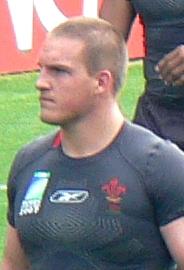
The New Zealand national rugby union team, commonly known as the All Blacks, represents New Zealand in men's international rugby union, which is considered the country's national sport. Famed for their international success, the All Blacks have often been regarded as one of the most successful sports teams in history.

Martin Osborne Johnson CBE is an English retired rugby union player who represented and captained England and Leicester in a career spanning 16 seasons. He captained England to victory in the 2003 Rugby World Cup, and is regarded as one of the greatest locks ever to have played, and one of England's greatest ever players.

The Australia national rugby union team, nicknamed the Wallabies, is the representative national team in the sport of rugby union for the nation of Australia. The team first played at Sydney in 1899, winning their first test match against the touring British Isles team.

The Wales national rugby union team represents the Welsh Rugby Union in men's international rugby union. Its governing body, the Welsh Rugby Union (WRU), was established in 1881, the same year that Wales played their first international against England. The team plays its home matches at the Millennium Stadium in Cardiff, which replaced Cardiff Arms Park as the national stadium of Wales in 1999.

The Great Britain national rugby league team represents Great Britain in rugby league. Administered by the Rugby Football League (RFL), the team is nicknamed The Lions.
The Australian national rugby league team, the Kangaroos, have represented Australia in senior men's rugby league football competitions since the establishment of the game in Australia in 1908. Administered by the Australian Rugby League Commission, the Kangaroos are ranked first in the IRL Men's World Rankings. The team is the most successful in Rugby League World Cup history, having won the competition 12 times, and contested 15 of the 16 finals, only failing to reach the final in the 1954 inaugural tournament. Only five nations have beaten Australia in test matches, and Australia has an overall win percentage of 69%.

The France national rugby league team represents France in international rugby league matches. They are referred to as les Chanticleers or less commonly as les Tricolores. The team is run under the auspices of the Fédération Française de Rugby à XIII.

The England national rugby league team represents England in international rugby league.

The Fiji national rugby union team represents Fiji in men's international rugby union. Fiji competed in the Pacific Tri-Nations and now competes in its successor tournament Pacific Nations Cup. Fiji also regularly plays test matches during the June and November test windows. They have beaten the major rugby playing sides of Wales, Scotland, Australia, France, Italy, Argentina and England. The only major sides Fiji are yet to beat are New Zealand, South Africa and Ireland.

Cardiff Rugby Football Club is a rugby union club based in Cardiff, the capital city of Wales. The club was founded in 1876 and played their first few matches at Sophia Gardens, shortly after which relocating to Cardiff Arms Park where they have been based ever since.

Gethin Jenkins is a Welsh former professional rugby union player who played as a prop for Pontypridd, Celtic Warriors, Cardiff Blues and Toulon. At international level, he won 129 caps for Wales. On his 105th appearance in 2014, he became Wales' most-capped player, overtaking the record held by Stephen Jones; having earned his final cap in November 2016, his record was surpassed by Alun Wyn Jones in September 2019. He is one of a small group of Welsh players to have won three Grand Slams. He also won five caps for the British & Irish Lions on three tours in 2005, 2009 and 2013. He is the sixth most-capped player in rugby union history and the most-capped front-row forward.

Warren David Gatland is a New Zealand rugby union coach and former player who is the head coach of the Wales national team.

Martyn Elwyn Williams, is a Welsh former professional rugby union player who played as a flanker. He earned 100 caps for the Wales national team, the most by a forward until he was surpassed by Gethin Jenkins in November 2013. He remains Wales's most-capped back-row forward. He also played for the British & Irish Lions, touring Australia in 2001, New Zealand in 2005 and South Africa in 2009. Overall, he played 17 times for the Lions across the 3 tours scoring 2 tries which included 4 test matches.

Rugby union in Fiji is a popular team sport and is considered to be the national sport of the country. The sport was introduced to Fiji in the 1880s. Fiji is defined as a tier two rugby nation by World Rugby. The national team has competed at the Rugby World Cup and made it as far as the quarter-finals. Their sevens team is also noted for their success, winning multiple Olympic gold medals, World Rugby Sevens Series and Rugby World Cup Sevens.
Thomas Patrick David is a Welsh former dual-code international rugby union and rugby league footballer who played in the 1970s and 1980s. He played representative rugby union (RU) for Wales and the British Lions and rugby league (RL) for Wales. He was selected for the 1974 British Lions tour to South Africa, and at the time played club rugby for Llanelli RFC. He also played for his home-town club Pontypridd RFC, and while at the club was part of the 1976 Grand Slam winning Wales team. In 1981 he switched codes to rugby league, representing Cardiff City Blue Dragons.
The French national rugby union team first competed at the 1900 Summer Olympics.

Lynn Howells is a Welsh rugby union coach, who until March 2018 was the head coach of the Romanian national team, having been the manager of the national side for 10 months prior to his appointment. Howells, born in Maerdy in Rhondda Valleys, played flanker at his nearest club Tylorstown RFC, before playing for Penygraig RFC. There he was noticed by Pontypridd RFC, and represented one of the top clubs in Wales in 1971.
Ian Martin Buckett is a former international rugby union front row forward who played for Swansea and London Welsh and played county rugby for North Wales. He was a championship winning player, an international and an academic.
David "Dai" Jenkins initially played Rugby Union. He changed codes when he was 21 and played Rugby League between 1935-1957, mainly for Leeds Rugby League Club as a scrum-half.

Frank William Whitcombe, also known by the nickname of "The Big Man", was a Welsh rugby union, and professional rugby league footballer who played in the 1930s and 1940s. He played rugby union (RU) for Cardiff RFC, London Welsh RFC, Aldershot Services and Army Rugby Union, as a prop, i.e. number 1 or 3, and representative level rugby league (RL) for Great Britain, Rugby League XIII, and Wales, and at club level for Broughton Rangers and Bradford Northern, as a prop, i.e. number 8 or 10, during the era of contested scrums.


















